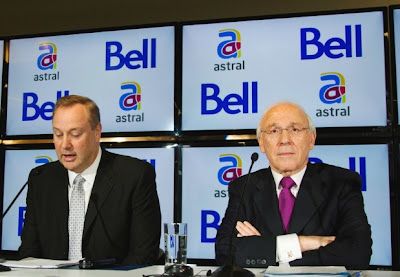First, we saw the CRTC block the takeover of Astral Media by Bell, and its parent, BCE. It was a deal that would have, by estimates, resulted in Bell controlling 33-45% of all English speaking content in Canada. The deal was widely expected to be approved by industry watchers, as evidenced by the 16% drop in Astral Media shares when the rejection was announced (ouch...).
In a decision broadly reminiscent of the late 90s actions by the government to block 2 major bank mergers (anyone still remember Paul Martin? lol), the Canadian government has put its foot down yet again to ensure adequate levels of competition and prevent a concentration of market power. Personally I believe the CRTC made the correct call here, as the Herfindahl Index, a measure of competitiveness within an industry, would increase significantly if a single company controlled nearly 50% of the market.
The Herfindahl Index is calculated by summing the squares of the market share of each company in the industry. In a monopoly scenario, where one company controls nearly the entire market, the index is ~1. In a very competitive market filled with many small players, the index is ~0.
Here are two examples of how the index is calculated.
Company A has 30% market share. Company B has 40% market share. Company C has 30% market share.
Herfindahl Index = 0.3 ^ 2 + 0.4 ^ 2 + 0.3 ^ 2 = 0.34
Company A has 85% market share. Company B has 10% market share. Company C has 5% market share.
Herfindahl Index = 0.85 ^ 2 + 0.1 ^ 2 + 0.05 ^ 2 = 0.735
How does the government decision regarding BCE and Astral Media affect our investment decisions? In a research note provided by Jeff Fan, a telecom sector analyst at Scotiabank, BCE's forward dividend strategy could be threatened by this decision. Jeff believes that without Astral, BCE will no longer be able to grow its dividend at its current pace. This mirrors what I've been saying for some time, that BCE's high dividend yield is a result of its higher dividend to FCF ratio, and should be a yellow flag for investors, because forward growth is severely limited with such a high payout ratio.
Petronas Towers, once the tallest buildings in the world, stand at over 450m tall and consist of 88 floors, 78 elevators. Petronas the company occupies all of tower 1.
This deal probably would have actually gone thru had Petronas not demanded the government make an immediate decision when asked to extend the deadline to allow more considerations. The government is taking a hard stance here regarding the 'net benefit' test on foreign takeovers.
Personally I don't like the concept of letting SOEs buy our natural resource assets, and it seems like our federal government may be signalling it is also uncomfortable with it. This spells trouble for CNOOC's Nexen deal, which is 2.5x bigger than the Petronas deal, and with a government that is arguably way more sketchy and untrustworthy.
What will happen? and how will this affect investors? It is hard to say now, but events like this could very well play into US major integrated oil company's hands. Bottom line is some level of expertise is needed to help Canadian companies extract maximum value out of their assets. Whether that expertise comes from SOEs like CNOOC or Petronas, or from US companies like Exxon (which just bought Celtic Exploration this week and rumors are flying it may target Encana!) or Chevron, remains to be seen.


It's a fine line balancing the interest of Canadian businesses and that of Canada itself. I don't like SOEs buying our companies either because they have an unfair advantage. If they're backed up by a state that has control over their own currency, then they have virtually unlimited capital. Nexen shares dropped 4% so far today. I don't own it, but I do have Encana. I wouldn't mind if ECA sold to XOM in a stock purchase, as long as the premium is good :0) Would be a great way to own a piece of Exxon.
ReplyDeletegood luck on ECA, but as a XOM shareholder, i hope they use cash + debt. not a fan of using stock to fund takeovers
ReplyDelete